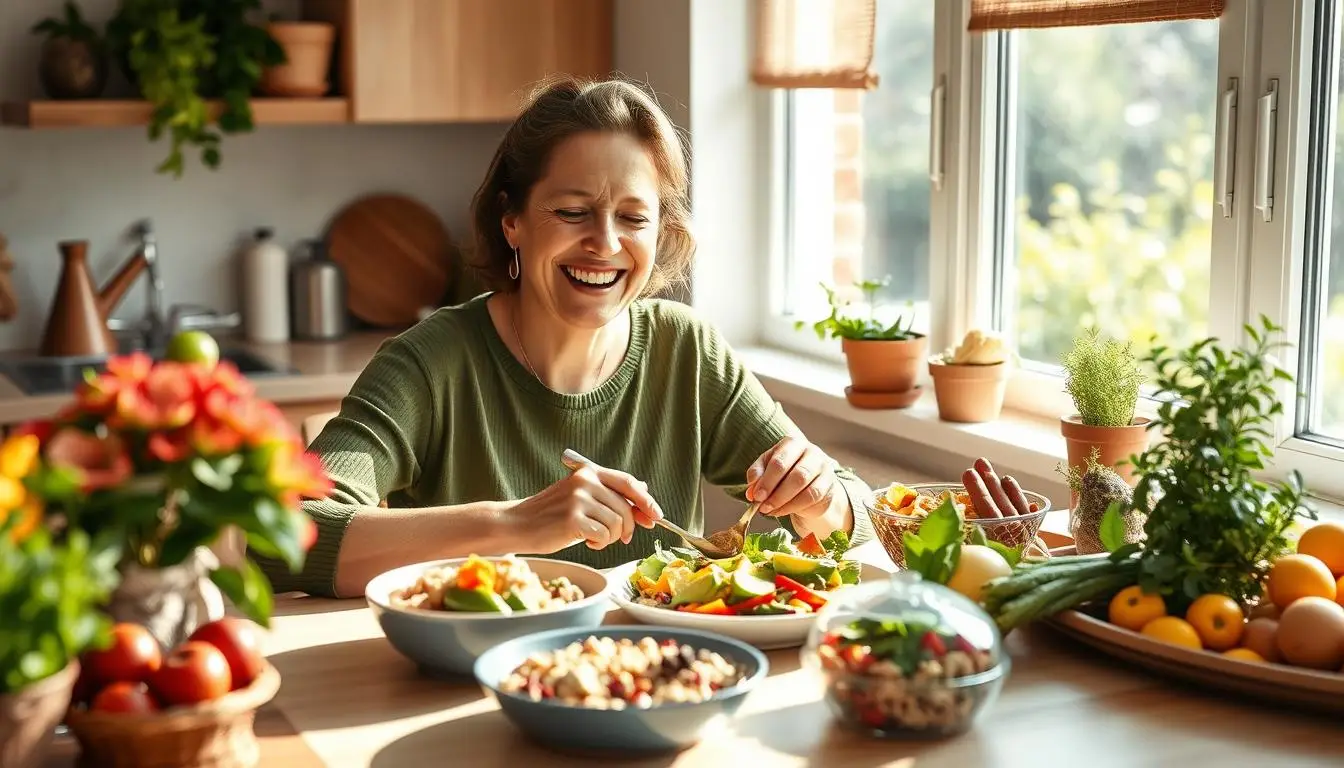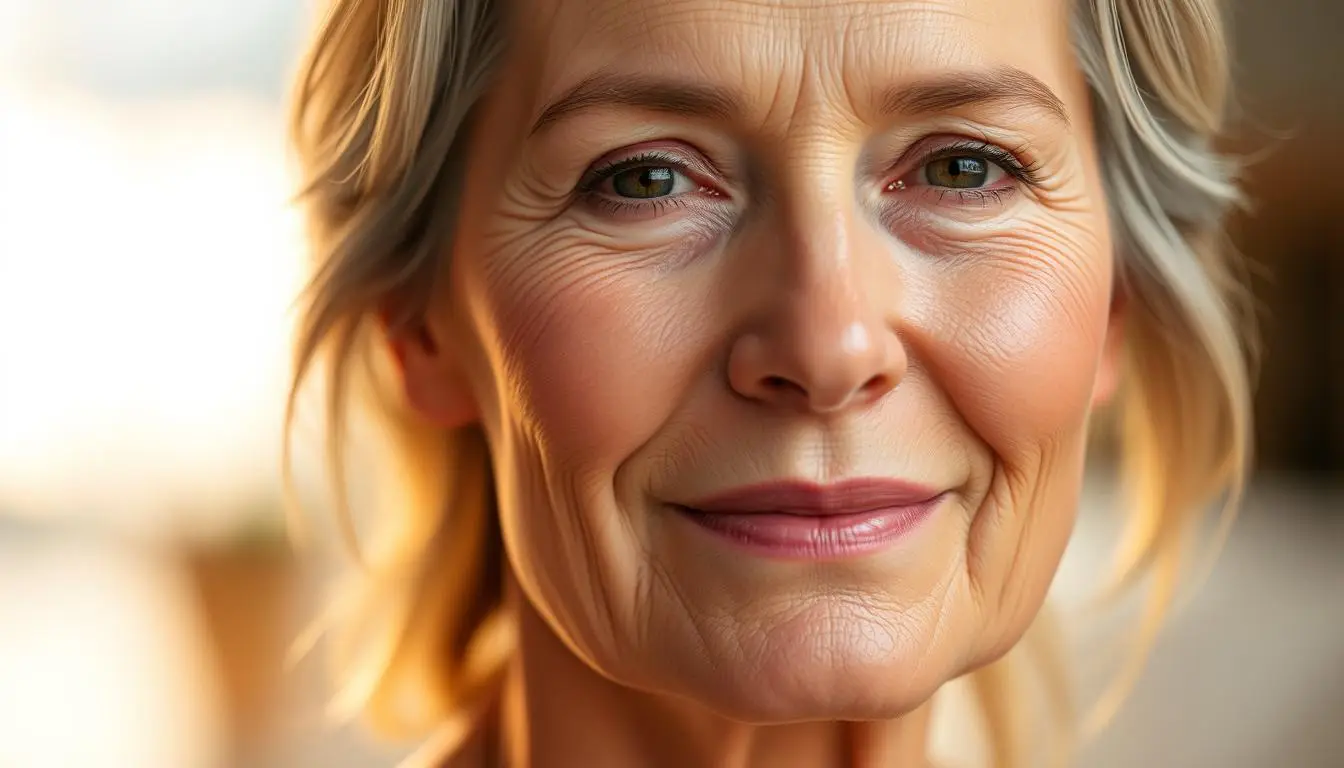Can a plant-based diet unlock vibrant health and longevity for women? As you explore healthy aging, vegan nutrition might be the answer you’re looking for.
Recent research shows that women eating more plant-based protein tend to be healthier. It gives a better mental and phsyical health and lower the risks of chronic diseases. This guide explores how plant-based diets benefit women’s health, offering you the knowledge and tools for a nutrient-rich diet.
In this guide, you’ll learn about key nutrients for well-being and how to lower disease risks. You’ll also get practical tips for starting a plant-based lifestyle. Whether you’re already vegan or just interested in knowing more, this guide will help you make choices that boost your health and longevity.
Key Takeaways:
- Plant-based diets rich in nutrients can promote healthy aging in women
- Consuming more plant protein is linked to better mental and physical health
- A vegan nutrition approach may reduce the risk of chronic diseases
- Practical tips for transitioning to a plant-based lifestyle are provided
- Embrace a longevity diet to support vibrant health as you age
Understanding the Benefits of Plant-Based Diets for Women’s Health
Switching to a plant-based diet can greatly improve women’s health. It boosts well-being and lowers the risk of chronic diseases. Eating whole plant foods gives you the vitamins, minerals, and antioxidants your body needs.
A recent study found that plant-based diets are good for women’s health. They lower the risk of heart disease, some cancers, and other chronic conditions. This is because plant-based diets are full of fiber and antioxidants, which fight inflammation and oxidative stress.
Nutrient-Dense Foods for Optimal Well-Being
Adding a variety of nutrient-rich plant foods to your diet is crucial for women’s health. Here are some examples:
- Leafy greens: Spinach, kale, and collard greens are rich in vitamins A, C, and K, as well as folate and calcium.
- Berries: Blueberries, raspberries, and strawberries are packed with antioxidants that promote heart health and cancer prevention.
- Legumes: Beans, lentils, and peas provide plant-based protein, fiber, and essential minerals like iron and magnesium.
- Whole grains: Quinoa, brown rice, and oats offer complex carbohydrates, B vitamins, and minerals for sustained energy.
By choosing these nutrient-dense foods, your body gets the nourishment it needs to thrive. Especially women going through menopause stage. This menopause diet guide shows how a balanced plant-based diet can ease symptoms during menopause.
Reduced Risk of Chronic Diseases
Plant-based diets offer more than just nutrition. They can lower the risk of chronic diseases in women. This includes:
| Disease | Risk Reduction |
|---|---|
| Heart Disease | 31-32% lower risk |
| Breast Cancer | 15-18% lower risk |
| Type 2 Diabetes | 23-34% lower risk |
The risk reductions come from the nutrients, fiber, and antioxidants in whole plant foods. Cutting down on saturated fats, cholesterol, and processed foods helps your heart health and lowers disease risk.
“Eating a plant-based diet is one of the most powerful steps you can take to improve your health, boost energy levels, and prevent chronic diseases.”
– Dr. Neal Barnard, Physician and Nutrition Researcher
Embracing a plant-based lifestyle is a proactive approach to women’s health and longevity. By focusing on nutrient-dense whole plant foods and antioxidant-rich options, you can support optimal well-being and reduce your risk of chronic diseases. This sets the stage for a healthy future.
Key Nutrients for Women’s Health in Plant-Based Diets
When you start a plant-based diet, it’s key to watch out for certain nutrients. These are important for women’s health. Eating a variety of nutrient-rich foods helps your body get what it needs for good health.
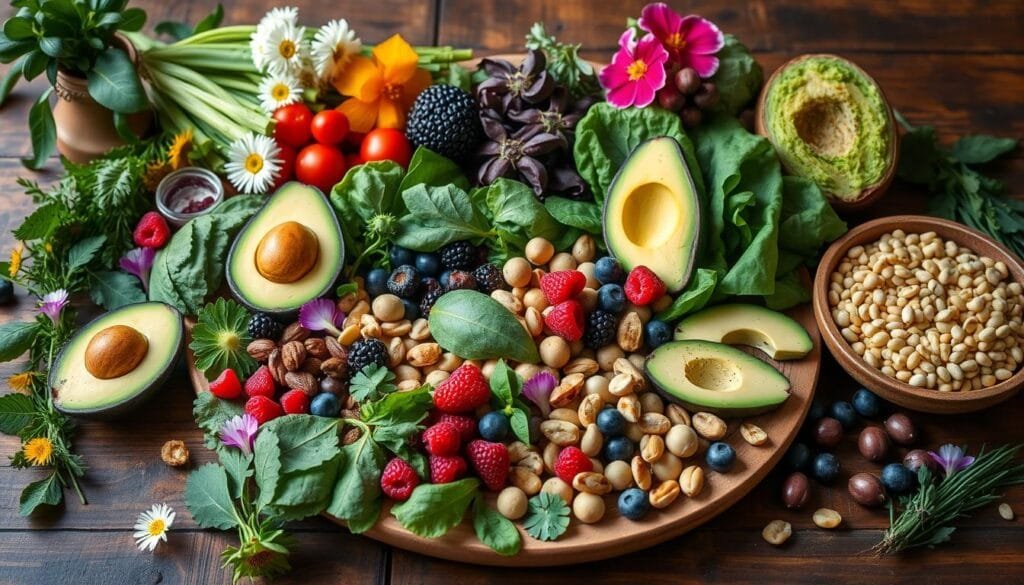
Calcium is a must for women on a plant-based diet. It helps keep bones strong and prevents osteoporosis. You don’t need dairy to get enough calcium. There are many plant-based foods that are great sources:
- Dark leafy greens like kale, collard greens, and bok choy
- Calcium-fortified plant milks and yogurts
- Tofu made with calcium sulfate
- Almonds and sesame seeds
Vitamin D is also key for bone health. It helps your body use calcium better. You can get vitamin D from sunlight, fortified plant milks, mushrooms grown under UV light, and supplements.
Iron is another important nutrient for women on a plant-based diet. It helps carry oxygen and prevents anemia. Here are some plant-based iron sources:
| Food | Iron Content (mg) per 100g |
|---|---|
| Lentils, cooked | 3.3 |
| Chickpeas, cooked | 2.9 |
| Tofu, firm | 2.7 |
| Quinoa, cooked | 1.5 |
To better absorb the iron in plant-based food, it’s also important to eat them with high in vitamin C foods. Like citrus fruits, bell peppers, and leafy greens are good choices.
Finally, vitamin B12 is crucial for women on a plant-based diet. It’s important for nerve function and making red blood cells. Since it’s mainly found in animal products, vegans and vegetarians should look at fortified foods or supplements.
“A well-planned vegan diet can support healthy living in people of all ages.” – The American Dietetic Association
By focusing on these nutrients and eating a variety of whole plant foods, women can do well on a plant-based diet. This supports their health and well-being.
Adapting to a Plant-Based Lifestyle for Healthy Aging
Starting a plant-based lifestyle might seem hard at first. But, with the right approach, it can be rewarding and help you age healthily. By making small changes, planning meals, and staying motivated, you can enjoy the benefits of a plant-based diet.
Gradual Transition and Meal Planning
Adopting a plant-based diet should be done slowly. Start by adding more fruits, veggies, whole grains, and legumes to your meals. Try meatless meals a few times a week and increase it as you get more comfortable with cooking without meat.
Planning your meals is crucial for a balanced diet. Look for plant-based recipes, make a weekly menu, and prep your meals ahead. This way, you’ll avoid unhealthy convenience foods and have healthy options ready.
Overcoming Common Challenges
One big worry is getting enough protein on a plant-based diet. But, many plant foods are high in protein, like tofu, lentils, chickpeas, and quinoa.
| Plant-Based Protein Source | Protein Content (per 100g) |
|---|---|
| Tofu | 10-19g |
| Lentils | 9g |
| Chickpeas | 19g |
| Quinoa | 4.4g |
Finding plant-based versions of your favorite dishes can be tough. But, with a bit of creativity, you can easily make most recipes vegan by using tofu, tempeh, or plant-based milk instead of animal products.
Staying Motivated and Consistent
It’s important to stay motivated to keep up with a plant-based diet. Surround yourself with people who support your choices. Also, join online or local groups that share your values for advice and encouragement.
“The food you eat can be either the safest and most powerful form of medicine or the slowest form of poison.” – Ann Wigmore
Remember, it’s not about being perfect but making progress. Celebrate your wins, learn from failures, and focus on becoming a healthier, more vibrant version of yourself!
Plant-Based Foods for Women’s Longevity
Discover the power of whole plant foods that typically contains antioxidant-rich ingredients. There are many tasty recipes out there. Those dishes are full of flavors and packed with vitamins, minerals, and phytochemicals for healthy longeivity diet.
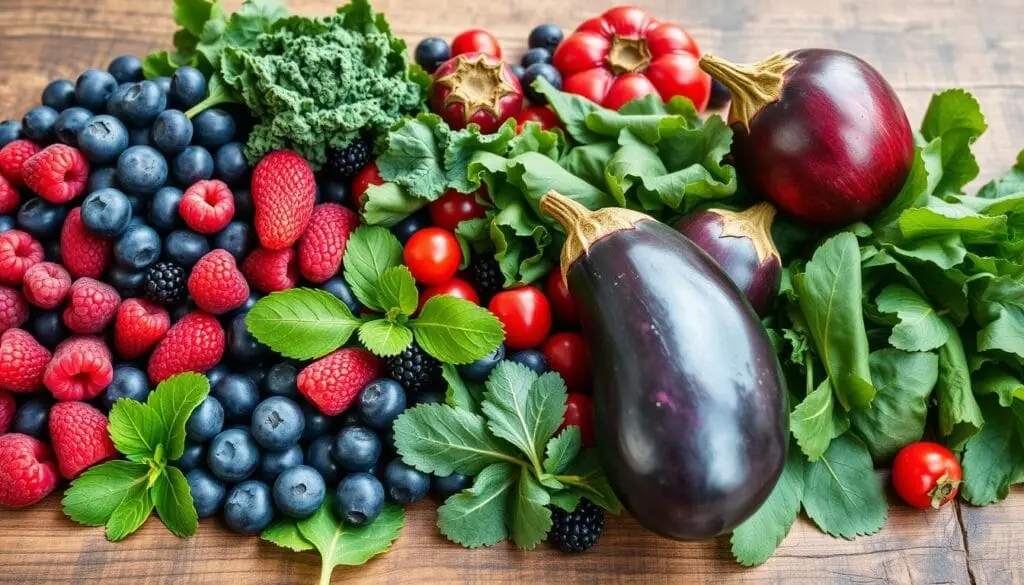
Begin your day with a Superfood Smoothie Bowl. It’s loaded with berries, leafy greens, and plant-based protein. This energizing breakfast will keep you going all morning:
“I love starting my day with a nutrient-dense smoothie bowl. It’s a delicious way to load up on antioxidants and fiber, setting the tone for a healthy day ahead.” – Sarah, 42
For lunch or dinner, you can make a Rainbow Quinoa Salad. It has colorful vegetables, protein-rich quinoa, and a zesty lemon-herb dressing. This dish is great on its own or with your favorite plant-based protein:
| Ingredient | Amount |
|---|---|
| Cooked quinoa | 2 cups |
| Cherry tomatoes, halved | 1 cup |
| Cucumber, diced | 1 cup |
| Red bell pepper, diced | 1 cup |
| Red onion, finely chopped | 1/4 cup |
| Fresh parsley, chopped | 1/4 cup |
| Lemon juice | 2 tbsp |
| Olive oil | 2 tbsp |
| Salt and pepper | To taste |
Enjoy a guilt-free treat with our No-Bake Chocolate Walnut Brownie Bites. They’re made with dates, raw cacao, and walnuts. These bites offer a sweet fix while nourishing your body with healthy fats and antioxidants.
Adding these plant-based foods to your diet will delight your taste buds and support your health. Embrace whole plant foods and start a delicious journey towards lifelong wellness.
Women Healthy Aging with Plant-Based Diets: Success Stories
Switching to a plant-based diet can change women’s lives for the better. Many women have seen big improvements in their health. They feel more energetic and overall well-being has improved.

Real-Life Experiences and Testimonials
Women from different backgrounds have shared their amazing journeys. Sarah, a 45-year-old mom, used to feel tired all the time and had stomach problems. But after going vegan, she felt a huge energy boost and her stomach issues went away. She says, “I never knew how much my diet was impacting my health until I made the switch. Now, I feel like a new person!”
Lisa, a 55-year-old businesswoman, had high blood pressure and heart disease in her family. But after going plant-based, her blood pressure went down, her cholesterol improved, and she lowered her heart disease risk.
“I feel empowered knowing that I’m taking control of my health and aging gracefully,”
Lisa says with joy.
Inspiring Transformations and Improved Quality of Life
Plant-based diets do more than just improve physical health. They also boost mental clarity, mood, and purpose. Jennifer, a 60-year-old retiree, talks about how her life changed:
“Since embracing a plant-based diet, I’ve noticed a significant improvement in my cognitive function and overall happiness. I have more energy to pursue my passions and spend quality time with my loved ones. It’s been a truly life-changing experience.”
These stories show that women can age healthily with plant-based diets. By focusing on vegan nutrition, women can live their best lives. They can avoid chronic diseases and enjoy a vibrant life into their golden years.
Addressing Concerns and Myths about Plant-Based Diets
Starting a plant-based diet can raise some questions. Let’s clear up common myths and give you the facts. This will help you make smarter choices.
Protein Intake and Muscle Health
Many think vegan diets don’t have enough protein for muscles. But, a well-planned vegan diet has all the amino acids you need. Eat a mix of protein-rich foods like legumes, tofu, nuts, and seeds to get enough protein.
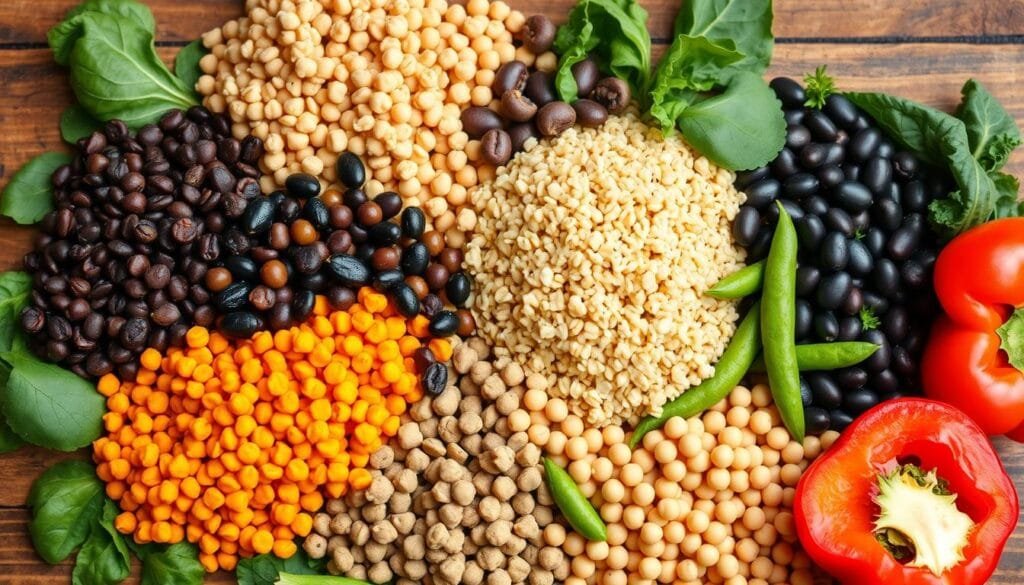
| Food | Protein per 100g |
|---|---|
| Tofu | 8g |
| Lentils | 9g |
| Chickpeas | 19g |
| Quinoa | 4g |
Calcium and Bone Density
Some worry that plant-based diets might harm bone health because they lack dairy. But, there are other ways to get calcium. Eat foods like dark leafy greens, fortified plant milks, and calcium-set tofu to keep bones strong.
- Dark leafy greens (kale, spinach, collard greens)
- Fortified plant milks and yogurts
- Calcium-set tofu
- Sesame seeds and tahini
Also, regular exercise and enough vitamin D help with bone health.
Iron Deficiency and Anemia
Iron deficiency anemia is a big worry, especially for women. Plant-based diets have iron, but it’s not as easily absorbed as animal-based iron. To improve iron absorption, eat foods high in vitamin C with iron-rich plants. Also, soak and sprout legumes and grains to make iron more available. And, avoid drinking tea and coffee with meals, as they can block iron absorption.
“The Academy of Nutrition and Dietetics states that appropriately planned vegetarian, including vegan, diets are healthful, nutritionally adequate, and may provide health benefits for the prevention and treatment of certain diseases.”
By choosing a balanced, nutrient-rich plant-based diet, you can stay healthy and live a compassionate lifestyle.
FAQ
Q: What is the impact of a vegan diet on biological age?
A: New research suggests that following a vegan diet can lower biological age estimates compared to an omnivorous diet, potentially leading to healthier aging.
Q: How does a plant-based diet influence the aging process?
A: Research indicates that a plant-based dietary pattern may help slow the aging process by reducing the oxidative stress associated with age-related diseases.
Q: Can a short-term vegan diet affect skin aging?
A: Yes, studies have shown that a short-term vegan diet can slow signs of aging, including skin aging, by providing a rich source of antioxidants.
Q: What are the benefits of a whole-food plant-based (WFPB) diet for aging?
A: Following a WFPB diet is associated with improved overall health and can reduce biological age, contributing to healthy longevity.
Q: How does the vegan diet compare to the Mediterranean diet in terms of aging?
A: While both diets promote healthy aging, research suggests that a vegan diet may have more pronounced effects on slowing the aging process and reducing biological age.
Q: What does the new study reveal about the effects of a vegan diet on type 2 diabetes?
A: New research indicates that a vegan diet could reduce the risk of developing type 2 diabetes, which is often linked to age-related health issues.
Q: Are there any specific dietary interventions that can help lower epigenetic age?
A: Yes, dietary interventions, such as an 8-week vegan diet, have shown promising results in lowering epigenetic age and improving health status.
Q: How does research suggest a vegan diet affects identical twins in aging studies?
A: Twin studies have demonstrated that pairs of identical twins following different diets, including a vegan diet, exhibit differences in biological age, highlighting the significant impact of dietary choices on aging.
Q: What are the long-term effects of a vegan diet on overall health as we age?
A: Long-term adherence to a vegan diet has been associated with numerous health benefits, including a lower risk of chronic diseases and better management of age-related health concerns.
Conclusion
Choosing a plant-based diet is a great way to stay healthy as you get older. Eating foods like fruits, vegetables, and whole grains gives your body what it needs. This can help you live longer and avoid chronic diseases.
Starting a plant-based diet might seem hard at first. But, with small steps and planning, you can make it work. Don’t worry about getting enough protein or calcium. There are many plant-based options out there.
Starting this journey is exciting, and you’re not alone. Many women have seen big health improvements by going plant-based. Their stories can inspire and keep you motivated.
By going plant-based, you’re investing in your future health. You’ll live a vibrant and fulfilling life. Enjoy the journey and thank yourself later for this choice.

